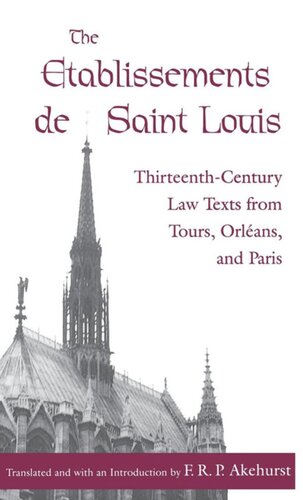

Most ebook files are in PDF format, so you can easily read them using various software such as Foxit Reader or directly on the Google Chrome browser.
Some ebook files are released by publishers in other formats such as .awz, .mobi, .epub, .fb2, etc. You may need to install specific software to read these formats on mobile/PC, such as Calibre.
Please read the tutorial at this link: https://ebookbell.com/faq
We offer FREE conversion to the popular formats you request; however, this may take some time. Therefore, right after payment, please email us, and we will try to provide the service as quickly as possible.
For some exceptional file formats or broken links (if any), please refrain from opening any disputes. Instead, email us first, and we will try to assist within a maximum of 6 hours.
EbookBell Team

5.0
40 reviewsAs the earliest major monument of the customary law in the region to the south and southwest of the Ile de France, the book known as the Etablissements de Saint Louis greatly amplifies our knowledge of feudal and private law in the French kingdom. Frequently cited by legal historians, it has nonetheless remained inaccessible to readers unable to master its difficult Old French. Now, F. R. P. Akehurst presents the text's first English translation, making this vital component of the vernacular law of thirteenth century France available to a wide range of scholars.
A hybrid text, the Etablissements was probably compiled by a lawyer around the year 1273. The book takes its name from its first part, a set of nine ordinances of Louis IX giving the rules of procedure for the court of the Chatelet in Paris. The second part, made up of one hundred and sixty-six short chapters, is a collection of the customary laws of the Touraine-Anjou region; the thirty-eight chapters of the third section record the laws of the Orleans region. Whereas the Touraine-Anjou material presents a broad treatment of many aspects of the law, the Orleans customary reveals a preoccupation with problems of jurisdiction in a region where the king and local authorities were in sharp competition for power.